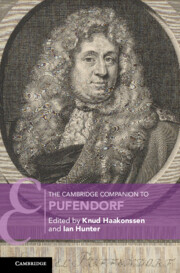Book contents
- The Cambridge Companion to Pufendorf
- Cambridge Companions to Law
- The Cambridge Companion to Pufendorf
- Copyright page
- Contents
- Contributors
- Abbreviations
- 1 Introduction: Life, Work and Historical Context
- 2 Politics and the Constitution of the Empire
- 3 Pufendorf’s Composite Method
- 4 The Metaphysics of Moral Entities
- 5 Human Nature, the State of Nature and Natural Law
- 6 Pacts, Language and Property
- 7 Family and Marriage
- 8 Pacts, Sovereignty and Forms of Government
- 9 The Civil Order: Law, Punishment and Social Value
- 10 The Law of Nations
- 11 Polemics and Controversies: Regarding the Eris Scandica
- 12 State, Church, Toleration, Reconciliation
- 13 Political Histories
- 14 Receptions, Contestations and Confusions
- Bibliography
- Index
1 - Introduction: Life, Work and Historical Context
Published online by Cambridge University Press: 25 November 2022
- The Cambridge Companion to Pufendorf
- Cambridge Companions to Law
- The Cambridge Companion to Pufendorf
- Copyright page
- Contents
- Contributors
- Abbreviations
- 1 Introduction: Life, Work and Historical Context
- 2 Politics and the Constitution of the Empire
- 3 Pufendorf’s Composite Method
- 4 The Metaphysics of Moral Entities
- 5 Human Nature, the State of Nature and Natural Law
- 6 Pacts, Language and Property
- 7 Family and Marriage
- 8 Pacts, Sovereignty and Forms of Government
- 9 The Civil Order: Law, Punishment and Social Value
- 10 The Law of Nations
- 11 Polemics and Controversies: Regarding the Eris Scandica
- 12 State, Church, Toleration, Reconciliation
- 13 Political Histories
- 14 Receptions, Contestations and Confusions
- Bibliography
- Index
Summary
Pufendorf was a political humanist, that is, an intellectual who engaged with political and religious thought through an erudite philological and analytical scrutiny of classical and modern texts in these fields. Born into a Saxon Lutheran clerical household in the middle of the Thirty Years’ War, he had first-hand experience of religious and political conflict during his childhood. His mastery of Latinate humanistic erudition was formed through his rhetorical education at the Grimma grammar school and then through his studies in history, philology and politics at the University of Leipzig. Pufendorf used his humanistic erudition as a key resource in his fundamental reconstruction of the discipline of natural law in his Law of Nature and Nations of 1672. In this work he sought to provide a model of political authority suited to governing divided religious communities, in part to defend the Protestant religion against the threat of political Catholicism, but primarily to achieve peaceful co-existence among different religions under the umbrella of a secular sovereign state. His work as an historian and political adviser to the Swedish and Brandenburg courts reflects the engaged nature of his humanistic learning.
Keywords
- Type
- Chapter
- Information
- The Cambridge Companion to Pufendorf , pp. 1 - 32Publisher: Cambridge University PressPrint publication year: 2022

